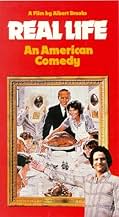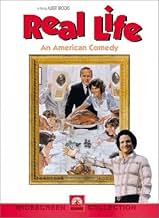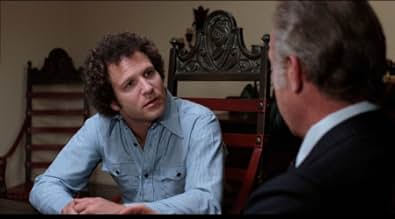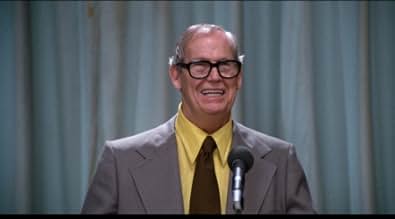VALUTAZIONE IMDb
7,0/10
4388
LA TUA VALUTAZIONE
Aggiungi una trama nella tua linguaA film crew sets out to record a year in the life of an average family, but things quickly start going wrong.A film crew sets out to record a year in the life of an average family, but things quickly start going wrong.A film crew sets out to record a year in the life of an average family, but things quickly start going wrong.
- Regia
- Sceneggiatura
- Star
Recensioni in evidenza
Albert Brooks, earlier in his career, may not have been the most appealing person in show business, but his screen persona was then certainly one of the funniest: insecure, obsessive, vain, and obnoxious enough to make his low-key, self-deprecating satires a definite acquired taste. In this mock cinema verité parody of a then topical PBS reality series he attempts to document on camera one year in the life of the second-most typical family in America (the runner-up was preferred in order to avoid a winter in Green Bay, Wisconsin). But the scientific enquiry meets with several unforeseen obstacles, not the least of which is a complete breakdown of the actuality Brooks wants so desperately to capture. Charles Grodin's typically deadpan performance sets the proper comic mood, and the scenario includes plenty of cinema in-jokes sure to raise a chuckle from any film student (it might have been titled 'Reel Life'). One highlight is the slow-motion family frolic meant to show highbrow French critics what the word 'montage' is all about.
Any Albert Brooks fan who has not seen his first glorious feature is truly missing out. As anyone can attest, Brooks has the rare gift of turning ordinary human moments into riotously funny scenes, and this film is full of such moments, plus much more subversive material, like the way Grodin's character repeatedly comes perilously close to committing a felony against his family.
Perhaps the greatest joke of all is that while the character "Albert Brooks" continuously states how he is documenting real life, we all know that this is really a star vehicle for him. He is more concerned with how much everything costs, like the head-held cameras (for those who haven't seen it, imagine the result of torrid affair between Dave Bowman and the Hal-9000). This film, more that anything, is a satirical take on how Hollywood subverts what is really "real life," all this coming from a director with as great a grasp on how humans relate to one another than anyone.
Perhaps the greatest joke of all is that while the character "Albert Brooks" continuously states how he is documenting real life, we all know that this is really a star vehicle for him. He is more concerned with how much everything costs, like the head-held cameras (for those who haven't seen it, imagine the result of torrid affair between Dave Bowman and the Hal-9000). This film, more that anything, is a satirical take on how Hollywood subverts what is really "real life," all this coming from a director with as great a grasp on how humans relate to one another than anyone.
Local 'madness' in an Arizona small, one horse town. Based on a show shot in Santa Barbara California in 73' a first reality show, that went horribly wrong! It was a hit, but the family was never the same. This is an off the cuff answer to that first reality show, that I believe may have gone lost in translation.
Sure this starts out interesting and goes right along, showing a small Arizona Phoenix as the place where the real family will be followed by a camera and crew, in the home, in their lives and all over the place. It seems at times so depressing and so real in parts... that it hurts just watching. That's not bad when it seems that it is real. Brooks has a creative and wild mind. With it all some how he can lose people in his presentation. It isn't that he is not talented, he just sees things through a different ' lens ' than most average do.
If more people had been informed of why and how the movie came about, I think it would have done better at the theater. Albert Brooks is an entertaining creative craftsman and his work and acting shows to those who can follow what he is about.
I recommend this movie for it's madness and reality type-lore but the fun part is seeing the Arizona from the seventies and how different it is today. Brooks will always be good at his job I believe, but you have to understand the mind from which it comes. (***)
Sure this starts out interesting and goes right along, showing a small Arizona Phoenix as the place where the real family will be followed by a camera and crew, in the home, in their lives and all over the place. It seems at times so depressing and so real in parts... that it hurts just watching. That's not bad when it seems that it is real. Brooks has a creative and wild mind. With it all some how he can lose people in his presentation. It isn't that he is not talented, he just sees things through a different ' lens ' than most average do.
If more people had been informed of why and how the movie came about, I think it would have done better at the theater. Albert Brooks is an entertaining creative craftsman and his work and acting shows to those who can follow what he is about.
I recommend this movie for it's madness and reality type-lore but the fun part is seeing the Arizona from the seventies and how different it is today. Brooks will always be good at his job I believe, but you have to understand the mind from which it comes. (***)
Albert Brooks (himself) undertakes an ambitious year long project documenting the lives of a typical American family. With the assistance of Psychological professionals and expensive testing and searching methods, Brooks' team selects the Yeager family of Phoenix, Arizona consisting of husband and wife Warren and Jeannette (Charles Grodin and Frances Lee McCain respectively) and their two children Lisa and Eric (Lisa Urette and Robert Stirrat respectively). As Brooks ingrains himself and his crew in the lives of the Yeager's the family come under ever increasing strain with Brooks' invasive presence in their lives.
Real Life is the directorial debut of comedian Albert Brooks. Brooks had attained prominence with his stand-up work as well as supporting parts on television and a bit role in Martin Scorcese's Taxi Driver. Brooks raised the money for the film's production budget himself and collaborated on the script Harry Shearer and Monica Johnson (the latter of whom would be a frequent collaborator with Brooks). When the film was released it received mixed reviews with much praise aimed at Charles Grodin's performance as Warren Yeager, but criticism directed at Brooks' "one note" performance. While the film did have champions such as Gene Siskel who claimed the film to be one of the funniest of the year, most critics liked the idea more than the execution. Real Life has some truly biting moments of satire and early signs of the promise of Brooks' future in the director's chair, there is a roughness in the execution that holds the movie back.
The fact that Harry Shearer is a co-writer on this film is rather appropriate, as it feels like a rough outline of ideas that would be adopted for a future mockumentary he'd be involved with, in This is Spinal Tap. The movie is very prescient with its satirization of PBS' An American Family where the invasiveness of cameras in one's life doesn't capture reality so much as distort it. Real Life feels like an indicator of what would serve as the template for reality TV with the reality often taking a backseat to Albert Brooks where the family are almost secondary characters in the movie that should be about them. The movie has some really strong moments of cutting humor with scenes such as the gynecologist office being uncomfortably funny. But there are also instances where the movie will abandon the Yeager family for long stretches as we focus on Albert Brooks negotiating with his Psychology advisors or studio executives in what are basically variations on the same point. While the central joke of the movie is in how Albert Brooks' character is making the movie more about him than the Yeagers (down to the fact he moves in across the street from them) most of the strongest set pieces are focused on the Family's interactions as they deal with the invasiveness of cameras in their lives but too often the family are sidelined. With that said there is some really funny material here that is both funny and intelligent but it's also rough and lacking in polish that comes from experience.
Real Life while moderately funny serves as more of a template for films such as This is Spinal Tap or Christopher Guest's filmography. It wouldn't be unfair to say that Real Life walked so that those future films could run and become the enduring classics they are. If you are a fan of those mockumentary style comedies like Best in Show or Waiting for Guffman then Real Life works as both an amusing diversion and a prototype of this type of comedic format. Slightly dated in some aspects, but predictive and ahead of its time in others.
Real Life is the directorial debut of comedian Albert Brooks. Brooks had attained prominence with his stand-up work as well as supporting parts on television and a bit role in Martin Scorcese's Taxi Driver. Brooks raised the money for the film's production budget himself and collaborated on the script Harry Shearer and Monica Johnson (the latter of whom would be a frequent collaborator with Brooks). When the film was released it received mixed reviews with much praise aimed at Charles Grodin's performance as Warren Yeager, but criticism directed at Brooks' "one note" performance. While the film did have champions such as Gene Siskel who claimed the film to be one of the funniest of the year, most critics liked the idea more than the execution. Real Life has some truly biting moments of satire and early signs of the promise of Brooks' future in the director's chair, there is a roughness in the execution that holds the movie back.
The fact that Harry Shearer is a co-writer on this film is rather appropriate, as it feels like a rough outline of ideas that would be adopted for a future mockumentary he'd be involved with, in This is Spinal Tap. The movie is very prescient with its satirization of PBS' An American Family where the invasiveness of cameras in one's life doesn't capture reality so much as distort it. Real Life feels like an indicator of what would serve as the template for reality TV with the reality often taking a backseat to Albert Brooks where the family are almost secondary characters in the movie that should be about them. The movie has some really strong moments of cutting humor with scenes such as the gynecologist office being uncomfortably funny. But there are also instances where the movie will abandon the Yeager family for long stretches as we focus on Albert Brooks negotiating with his Psychology advisors or studio executives in what are basically variations on the same point. While the central joke of the movie is in how Albert Brooks' character is making the movie more about him than the Yeagers (down to the fact he moves in across the street from them) most of the strongest set pieces are focused on the Family's interactions as they deal with the invasiveness of cameras in their lives but too often the family are sidelined. With that said there is some really funny material here that is both funny and intelligent but it's also rough and lacking in polish that comes from experience.
Real Life while moderately funny serves as more of a template for films such as This is Spinal Tap or Christopher Guest's filmography. It wouldn't be unfair to say that Real Life walked so that those future films could run and become the enduring classics they are. If you are a fan of those mockumentary style comedies like Best in Show or Waiting for Guffman then Real Life works as both an amusing diversion and a prototype of this type of comedic format. Slightly dated in some aspects, but predictive and ahead of its time in others.
There's no question that Albert Brooks is not for everybody - his particular blend of neuroticism and egomania can be way too much for most people. But if you can get on his wavelength, and when he's at his best - oh man! There's absolutely no one better. Real Life is Brooks' best movie, and deserves to be more widely known than it is. His portrayal of a controlling producer, who is willing to violate not only broadcast ethics but the standards of decency and good sense as well in order to inject life into his failing "documentary" is frightening, off-putting and truly hilarious all at once.
When I first saw this movie, I didn't realize it was based on an actual television experiment. I bring this up only because when I first saw the film, I felt its only flaw was that it didn't spend enough time showing the family and their disintegration in front of the cameras, choosing instead to focus almost exclusively on Brooks and his manic responses to the dilemma this posed. However, knowing that the real life experiment would have already been familiar to people, Brooks clearly wanted to use this movie to examine not the family but the bankrupt commercial mindset which would put such a project into play in the first place. As such, his satire is dead on and nobody could more perfectly embody the entertainment industry than Brooks himself. Just to see him smarmily singing and glad-handing at the beginning is worth the cost.
When I first saw this movie, I didn't realize it was based on an actual television experiment. I bring this up only because when I first saw the film, I felt its only flaw was that it didn't spend enough time showing the family and their disintegration in front of the cameras, choosing instead to focus almost exclusively on Brooks and his manic responses to the dilemma this posed. However, knowing that the real life experiment would have already been familiar to people, Brooks clearly wanted to use this movie to examine not the family but the bankrupt commercial mindset which would put such a project into play in the first place. As such, his satire is dead on and nobody could more perfectly embody the entertainment industry than Brooks himself. Just to see him smarmily singing and glad-handing at the beginning is worth the cost.
Lo sapevi?
- QuizAlbert Brooks was under a great deal of pressure to finish the film on-budget, because he would have been personally responsible for any extra costs. During one particularly difficult filming day, he sat feeling totally dejected. Charles Grodin walked up to him and said, "I have to leave at 4." This totally ridiculous request was sufficient to cheer Brooks up.
- BlooperIn the opening sequence the U.S. flag and the Arizona state flag are in the wrong positions behind the speakers. They should be switched per proper protocol.
- Citazioni
Albert Brooks: [showing off a high-tech camera to be used in filming] Only six of these cameras were ever made. Only five of them ever worked. We have four of those.
- Curiosità sui creditiThe end credits finishes with a bar-code for Alka-Seltzer.
I più visti
Accedi per valutare e creare un elenco di titoli salvati per ottenere consigli personalizzati
- How long is Real Life?Powered by Alexa
Dettagli
- Data di uscita
- Paese di origine
- Lingua
- Celebre anche come
- Aus dem Leben gegriffen
- Luoghi delle riprese
- Phoenix Zoo - 455 N Galvin Parkway, Phoenix, Arizona, Stati Uniti(The Yeagers visit the zoo during the montage.)
- Azienda produttrice
- Vedi altri crediti dell’azienda su IMDbPro
Botteghino
- Lordo Stati Uniti e Canada
- 364.642 USD
- Lordo in tutto il mondo
- 364.642 USD
Contribuisci a questa pagina
Suggerisci una modifica o aggiungi i contenuti mancanti




























